Mary Anne Yarde's Blog: The Coffee Pot Book Club , page 157
January 18, 2019
#BookReview — Under the Approaching Dark (The King's Greatest Enemy #3) By Anna Belfrage #HistoricalFiction #HistoricalRomance @abelfrageauthor
 Under the Approaching Dark(The King's Greatest Enemy #3)By Anna Belfrage
Under the Approaching Dark(The King's Greatest Enemy #3)By Anna Belfrage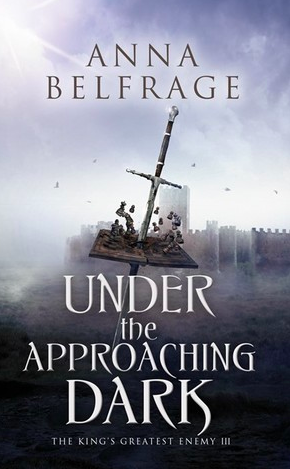
Adam de Guirande has cause to believe the turbulent times are behind him: Hugh Despenser is dead and Edward II is forced to abdicate in favour of his young son. It is time to look forward, to a bright new world in which the young king, guided by his council, heals his kingdom and restores its greatness. But the turmoil is far from over.
After years of strife, England in the early months of 1327 is a country in need of stability, and many turn with hope towards the new young king, Edward III. But Edward is too young to rule, so instead it is his mother, Queen Isabella, and her lover, Roger Mortimer, who do the actual governing, much to the dislike of barons such as Henry of Lancaster.
In the north, the Scots take advantage of the weakened state of the realm and raid with impunity. Closer to court, it is Mortimer’s increasing powers that cause concerns – both among his enemies, but also for men like Adam, who loves Mortimer dearly, but loves the young king just as much.
When it is announced that Edward II has died in September of 1327, what has so far been a grumble grows into voluble protests against Mortimer. Yet again, the spectre of rebellion haunts the land, and things are further complicated by the reappearance of one of Adam’s personal enemies. Soon enough, he and his beloved wife Kit are fighting for their survival – even more so when Adam is given a task that puts them both in the gravest of dangers.

Adam cannot help but fear for Mortimer’s future, for the Wheel of Fortune is forever turning. Past events should surely hint at a warning of what is to come. Despenser had it all and look where he is now. But there seems to be no stopping Mortimer’s ambition. Adam is but a spectator as the young King becomes increasingly resentful towards his Regent. Adam knows that Edward will one day snatch the lead rope from Mortimer’s hand and take control of the bridle. It is not a case of if, but when. And when that happens, God help any man who sides with Mortimer. Adam knows that one day soon he will have to choose between them. The question is, will he stand with Edward? Or, will he side with the Kingmaker?
Kit de Guirande has already lost a son to this medieval game of thrones. Will she lose her husband as well? If only Edward would allow Adam to be relieved of his duties at court, then all would be well. But Edward relies on Adam too much. So Kit must grin and bear it, for now at least...
From the terror of the Scottish raid on the newly crowned king’s camp at the Battle of Stanhope Park to the attempted rebellion of Henry of Lancaster, Under The Approaching Dark by Anna Belfrage is a medieval triumph.
This book is filled with memorable characters, non-stop action, a narrative that is as elegant as it is appealing and a story that is so riveting that time ceased to matter. This book, this series, is absolutely irresistible.
Belfrage writes with authority, but also incredible sensitivity. There is a great depth to the writing as well as a beautifully balanced perspective of what this time in history was like. The court of Edward III has been brought gloriously back to life in this remarkable retelling.
Told through the experiences of Adam and his wife Kit, Under The Approaching Dark, has much to recommend it. The struggles that our two brave protagonists faces are enough in itself to keep a reader turning those pages, let alone the intrigue, danger, and the ever-present threat of a rebellion at Edward's court. The cruel Despenser may be dead, but his associates are still very much alive, and while they breathe both Kit and Adam’s lives are in peril.
Aside from the constant threat of death, or worse, the gentle and passionate love story of Adam and Kit continues throughout this book. Their romance makes this series a must-read for anyone who loves historical romance fiction. I cannot help but compare it to Diana Gabaldon’s Outlander series. Adam’s and Kits relationship is as intense and as tantalising as Jamie’s and Claire’s. But this is more than just a romance book, Under the Darkening Sky is a comprehensive interpretation of the early days of King Edward III’s reign. It is a story not to be missed for it is a gripping account of war, ambition, betrayal and love. It is utterly engrossing from start to finish.
I thought the interpretation of the usurped Edward II was fabulous, and surprisingly he has his own moment of true heroism, which made him almost endearing.
Belfrage has written a compelling book about an extraordinary time in English history. This book and this series continue to hold my fascination, and I cannot wait to read book 4!
I Highly Recommend.
Review by Mary Anne Yarde.The Coffee Pot Book Club.
Amazon UK • Amazon US
Anna Belfrage
 Had Anna been allowed to choose, she’d have become a time-traveller. As this was impossible, she became a financial professional with two absorbing interests: history and writing. Anna has authored the acclaimed time travelling series The Graham Saga, set in 17th century Scotland and Maryland, as well as the equally acclaimed medieval series The King’s Greatest Enemy which is set in 14th century England. She has recently released the first in a new series, The Wanderer. This time, she steps out of her normal historical context and A Torch in His Heart is with a fast-paced contemporary romantic suspense with paranormal and time-slip ingredients.
Had Anna been allowed to choose, she’d have become a time-traveller. As this was impossible, she became a financial professional with two absorbing interests: history and writing. Anna has authored the acclaimed time travelling series The Graham Saga, set in 17th century Scotland and Maryland, as well as the equally acclaimed medieval series The King’s Greatest Enemy which is set in 14th century England. She has recently released the first in a new series, The Wanderer. This time, she steps out of her normal historical context and A Torch in His Heart is with a fast-paced contemporary romantic suspense with paranormal and time-slip ingredients.Find out more about Anna by visiting her website, or herAmazon page.
Published on January 18, 2019 23:00
January 17, 2019
Mysteries, Magic, and Wisdom of Trees, by Morgan Sheppard #folklore #trees #legends @MorganJSheppard
Mysteries, Magic, and Wisdom of Trees By Morgan Sheppard
The third book in my Wraidd Elfennol series, Of Land and Sky, starts off with an anonymous poem, entitled ‘The Poem of the Nine Woods’. This poem is pagan in origin, and tells a small story of which woods to burn, which have special meaning. I have always loved this poem, and loved having the opportunity to work with it.
During my research for my book, I was fascinated by the lore of the trees, which have been sadly forgotten by most in this ‘advanced’ age. I focussed on the nine trees in the poem, being Birch, Oak, Rowan, Willow, Hawthorn, Hazel, Apple, Vine, and Fir. For each tree, I discovered lost uses, stories, and folklore about them.
When Great Britain was invaded by the Romans, they found a land that was (then) largely covered by trees. Each species of tree had its own particular bounty to offer, whether it be shelter, food, or medicine. Some of this knowledge was lost in the wake of the Roman domination, as the Druidic tradition was oral.
What we do know is the Celtic people had a tree calendar, with thirteen trees featured, each ruling a different time. In this case, it is not dissimilar to the astrological calendar that is so well known today. Each ‘sign’ had its own associated colours and stones, strengths and weaknesses.

The oak tree is probably the tree most associated with England. Until the 20th century, the oak’s strong and durable timber was at the heart of our buildings, ships, and industry. The strength and number of England’s oaks have said to have played a big part in Britain’s past successes as a world power. The oak tree is a tree with a long life, taking around sixty years for a full crop of acorns to be produced.
The Welsh Druids revered the oak tree, seeing it as a reminder of the chief’s protection and the safety of his shelter. It was symbolic of triumph, through strength and endurance. It isn’t just the Welsh who respected the oak though. In Ireland, it was known as one of the Three Ancient Trees of Erinn, who was a goddess of fate. In Greece, the first tree created was the oak. Although a symbol of hospitality, the oak tree is also hit by lightning more frequently than any other tree.
King Arthur’s Round Table was said to have been made from a single slice of a massive oak and, like King Arthur, the oak was seen as a magical protector of Britain.
King Charles II escaped capture by hiding in an oak tree in 1651. He thereafter adopted the oak as his emblem. He returned to London on 29thMay, which was both Oak Apple Day, and his birthday. This day was officially renamed, becoming Royal Oak Day.
The oak is a reminder to have an open mind and a generous spirit, which in turn will give you the strength to prevail. However, the oak also serves as a reminder that resisting, with the oak’s stubborn strength, will not help a situation, and may lead to boughs breaking from strain.

The leaves, bark, and acorns of the oak have been used medicinally, and still are to this day. Bach Flower Remedies use oak for those who are disheartened, but struggle on. All the properties of the oak have astringent, antiseptic, and anti-inflammatory elements. From a compress for inflamed eyes, to a coffee substitute, and even as a bath to help treat chilblains and frostbite, the oak is a tree rich in history and medicine, if only you take the time to learn.

Of Land and Sky
(Wraidd Elfennol Book 3)
 The balance of the Elements is once more in doubt, and new Chosen are called. They need to find the will to succeed, or the unseen enemy from years gone by may have the advantage.
The balance of the Elements is once more in doubt, and new Chosen are called. They need to find the will to succeed, or the unseen enemy from years gone by may have the advantage.The Wheel of the Year has had many cycles - and the folk of Wraidd Elfennol have lived in peace since the age of Marella, Kai, Daren, and Lani. All the Elements have been in perfect harmony with each other.
All that is about to change, with new Chosen called to represent their Element and to find nine sacred branches.
Bran and Rhosyn need to work together to restore the balance between Earth and Air… and maybe find out just who they are meant to be.
Full of myth and magic, with a strong Welsh theme, Of Land and Sky continues the Fantasy series set in the imaginary world of Wraidd Elfennol.
Grab your copy today!
Amazon
Scroll down for a sneak peek behind the covers of Morgan Sheppard’s Of Land and Sky. There is also a chance to win one complete set of the Wraidd Elfennol series.
Excerpt
“Merry Meet, Chosen of Earth.”A deep voice rumbled inside Bran’s mind, very different to the female voice of the Birch.
“Merry Meet,” thought Bran in return. “How may I call you?”
“Bedwen Arian was right, you are a polite one,” rumbled the Oak. “You may call us Derw.”
“Do I understand that you know why I’m here then, sir Derw?” asked Bran, as he stood tall under the canopy.
“All the trees of Wraidd Elfennol know of your quest, young Bran,” answered Derw.
“And will you help me? Help us?”asked Bran.
“For a price, yes.”
“A price? What do I need to do?”questioned Bran, a hint of worry in his mental tone.
“Nothing for you to worry about, Chosen of Earth. I ask that you listen to my story, like you did with our lady Birch. Tell my tale to those who would listen. Let the trees live again.”
Bran heaved a sigh of relief. “That I can do, and with pleasure,”he stated, bowing his head to the Oaks in respect.
“Then listen carefully as I tell you tale of the Mighty Oak, the Lightning tree.”
Bran stood still as the oak trees began to speak to him.
“In times long ago, we were revered and respected. We were a symbol of hospitality, shelter, and protection, favouring the honest and the brave. Our branches were used to make wands, strong in protection and male energy. Our wood was always used as fuel for the Midsummer Fires. We reassured people that, with good will and hard work, they could prevail against the odds.
We have heard that in a land far away, a round table was made from a single slice of an oak. In fact, people used to carry a piece of us with them, and so long as they had asked us nicely first, it would draw good luck to them.
Our bark and leaves can help with skin complaints like frostbite, blisters, and even eczema. We could also make a soothing compress for your eyes.
Now, just the same as with all other trees, we are something forgotten.”
Bran stayed silent until he was sure that the oaks had nothing more to say. “I didn’t know about any of that,” he admitted to them.
“And now you see why we need you to tell our tales,” said the Oaks.
Bran nodded, feeling more determined than ever that once this quest was done, somehow he would find a way to help the trees.
“You have given us your vow that you will help, so it now our turn to help you. It is with honour you have asked, and it is with honour you shall receive. May you be blessed with love and friendship. Rowan is next, and she is where Fire is the strongest.”
Bran was silent as he felt the branches move towards where he instinctively knew Rhosyn now stood. The canopy opened and a branch about the size of his arm dropped into Rhosyn’s waiting arms.
“One last thing before you go, Chosen of Earth. We have two things to gift you.”Bran was startled at their words. “There is no need for any further gifts,” he said quietly to them. “Your sacrifice of a branch is more than enough. Plus you have gifted me with your story.”
“Nevertheless, two gifts further you will receive. The first is a piece of advice for you to think on. Just remember that stubborn strength that resists will not endure and may break under strain.”
Bran nodded as he memorised the words, and he planned to write them down as soon as he returned to the campsite.
“The second gift is something for both you and the Chosen of Air, although it takes different forms for you both.”
Bran was puzzled by the words and opened his mouth to question when he felt a sharp burning pain on his upper right arm. He quickly pulled his shirt aside to find a stunning picture of an oak tree and roots inside a circle with decorative knot-work.
“As above, so below. You now carry the blessing of the oak trees, always and forever. Hold out your hands.”
Bran did as instructed, wincing slightly as his shirt pulled across his arm. Into his hands dropped a small piece of oak, no bigger than large coin, with the same symbol pyrographed onto it.
“Please give this to the Chosen of Air. Without her, you couldn’t do this, so you are blessed with her, the same as she is blessed with you.”
“I will do, thank you Derw, so much. I will help you, I promise. I won’t allow you to be forgotten again.”
“This we know, your heart is strong and pure. You honour Lady Daire, and you honour the trees. We are proud to have spoken with you, Bran, son of Makani. We will send word of our meeting to the other trees. If any can help you, be assured they will. Now it is time for us to rest. It’s been an age since we have spoken for so long. Fare thee well, Chosen of Earth.”
“Merry Part, until we Merry Meet again,” said Bran formally, feeling the essence of the Oaks leave his mind. He took a deep breath and rolled his shoulders, muttering an oath under his breath as his shirt pulled yet again on his arm.
Giveaway
Morgan Sheppard is giving away one complete set of the Wraidd Elfennol books (four in total). A runner’s up prize of an e-copy of Marella, book one, will be available to four people.
To enter all you have to do is answer this question:
Which is your favourite tree, and why?
Leave you answer in the comment section at the bottom of this post!
Giveaway Rules
• Leave your answer in the comments at the bottom of this post.
• Giveaway ends at 11:59pm BST on January 31st.
You must be 18 or older to enter.
• Giveaway is open INTERNATIONALLY.
•Only one entry per household.
• All giveaway entrants agree to be honest and not cheat the systems; any suspect of fraud is decided upon by blog/site owner and the sponsor, and entrants may be disqualified at our discretion.
•Winners will be announced in the comments.
• Winner has 48 hours to claim prize or new winner is chosen.
Morgan Sheppard
 Originally from the United Kingdom, Morgan Sheppard now resides in Germany, although she freely admits to having left part of her heart in Wales. Morgan is the author of the fantasy series, World of Wraidd Elfennol, and also the contemporary, women’s fiction novella, Disjointed Lives.
Originally from the United Kingdom, Morgan Sheppard now resides in Germany, although she freely admits to having left part of her heart in Wales. Morgan is the author of the fantasy series, World of Wraidd Elfennol, and also the contemporary, women’s fiction novella, Disjointed Lives.Whilst a writer mainly in the fantasy genre, Morgan is more than happy to share her love of reading amongst the many different genres out there, and can always be found with a book close by.
As well as reading and writing, Morgan spends her time looking after her family and trying to learn German. Unfortunately, a natural aptitude for languages doesn’t appear to be one of her strong points. However, stubbornness is, so she continues to persevere. So far, Morgan is confident enough to order a beer and a pretzel.
Feel free to email her at MorganJSheppard@gmail.com or stalk her online on Facebook, Twitter, and Tumblr.
You can also subscribe to her mailing list here, and get a #FREE copy of Marella, the book that started the World of Wraidd Elfennol series: HERE!
Connect with Morgan: Website • Amazon • AUTHORSdb• BookBub • BookLikes • Facebook (Group)• Facebook (Page) • Twitter • Goodreads • Google+ • Instagram • Smashwords• Tumblr

Published on January 17, 2019 23:00
January 16, 2019
A conversation with Historical Romance author, Penny Hampson #Regency #Romance #MustRead @penny_hampson
A conversation with Historical Romance author, Penny Hampson.
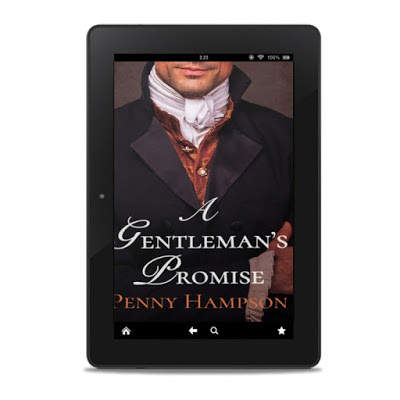
Welcome to Myths, Legends, Books & Coffee Pots… Before we sit down for our chat, over a nice cup of tea, could you tell my readers a little about yourself, please?
Hi, I’m Penny. I was born in the north west of England and lived there until my late teens. My childhood was filled with books; I was a member of two local libraries, visiting them alternately each Saturday and taking my full allowance of six books from each. It was the most wonderful feeling to head off home, bag bulging with reading material to hopefully last me for a week.
I gave up my job in the civil service on becoming a mum; my husband’s frequent job moves meant it was difficult to maintain a career and balance childcare. I’d been a full time home-maker for several years when my youngest child started school, so with time on my hands, I decided to take the plunge and study for a degree. I’d always loved history and this was an opportunity to pursue the subject at the highest level. After gaining an honours degree, I continued studying and successfully completed a post-graduate degree. This led to my dream job, working in a world-renowned academic library, surrounded by the most fantastic rare books and manuscripts.
Did I mention that I’m an avid reader? I devour books, especially history and historical fiction; I’ve also a soft spot for crime, thrillers, and romance. Reading did not form part of my day job, but I got through lots of books on my daily commute.
Sadly, all good things come to an end; after nineteen years I was needed at home again to care for a family member with a long-term illness. But I look on challenges as opportunities, and being at home has meant that I can now combine two of my passions: history and books. Now I don’t just read historical fiction, but I write it too.
Could you tell us what inspired you to write A Gentleman’s Promise?
Writing for me is a welcome escape from the stresses of everyday life. I can create characters who (nearly always) do what I want them to, though sometimes they lead me up unexpected paths. I want to write the sort of stories that I enjoy reading; stories with honourable gentlemen, intelligent heroines, maybe a few villains, but always a happy ever after. If we can’t always achieve that in real life, it’s nice to escape to a world where everything does work out. That’s my excuse, anyway.
I love the Regency period; as a teenager, I enjoyed Georgette Heyer’s stories with their sparkling dialogue, enigmatic male characters and wonderful heroines. Jane Austen, of course was another inspiration. Although the early nineteenth century was a time of great change, war, and hardship, both these authors created stories that highlighted other elements of the time: the social snobbery, the manners and the mores, the restrictions of women’s lives.
It was also an age of great wealth for those at the very top of society; the Prince of Wales was notorious for his profligate lifestyle and spending, and where he went, others followed. With rich patrons wanting to display their wealth, the arts flourished.
So setting my novel in the early 1800s was really a no-brainer for me; I love the architecture, the fashions, the personalities.
A Gentleman’s Promise is a story that, while touching on some of the more unsavoury elements of life, contains humour, mystery, and romance, with believable characters who will find their heart’s desire by the end (did I mention I enjoy romance?)
I have read A Gentleman’s Promise, and I loved it. You can read my review, here! Were there any challenges you faced while researching this period of history?
It was the small details that sometimes flummoxed me; like how long would it take for a rider to travel from the small village of Minster Lovell to Oxford, a distance of some twenty miles? What would his route be? It definitely would not be along the A40 as today! Believe it or not, however, the toll bridge at Eynsham that my character Richard uses is still very much in existence and heavily used by today’s commuters.
I also had to ensure my heroine Emma’s journey back to England from Greece was feasible. Even thought the war against Napoleon was in full swing, there were British people travelling to the Ottoman Empire, particularly academics and scholars. I spent many a happy hour on the computer reading journals and articles describing their journeys.
It is very alien to us how long these journeys took. I also find that a challenge when I write. There are many books set in the Regency period, can you tell us three things that set your novel apart.
Well, one thing I have noticed is that many Regency novels are about aristocrats and the upper echelons of society. My hero, Richard, who at first believes he has inherited a title, is not in fact an aristocrat; he is wealthy, but he is an engineer, a mine owner … a practical, risk-averse businessman. Emma too, being the daughter of a second son, is not a titled lady, and having spent a large portion of her life secluded from her peers, has not mixed in society.
There are no ballrooms or society events in my story. So many Regency stories have scenes set in ballrooms and I wanted to avoid all that. Yes, there are some drawing room scenes, but the action takes place in seedy inns, a gentleman’s club, and the backrooms of an exclusive brothel (I used my imagination for that).I’ve tried to be true to the period; there were women like Emma who wanted to be independent, who saw the dangers in marriage. I like to think that she could have existed. My villain was motivated by, what for him were very real fears of what would happen after his death. Without giving too much away, I can admit that I have some sympathy for his perceived predicament. Thank goodness we live in more modern times.
That is what I loved so much about your book. The setting was so different from what you read in many Regency Romances. Can you tell us what you are currently working on?
My next book in the Gentlemenseries is already completed. I hope to publish it within the next few months. An Officer’s Vow follows on from A Gentleman’s Promise, where we learn what happens to Major Nate Crawford.
Hampered by his war wounds, both physical and mental, Nate is returning home to the family estate when runaway heiress, Lottie Benham, literally falls into his path. What follows is an exciting journey through England involving kidnapping, espionage, and murder. Can tormented Nate overcome his personal demons? Will timid Lottie discover her hidden inner strength? Can this autocratic officer and reticent young lady work together to achieve their goals? Sometimes it’s not physical strength that’s required to defeat one’s enemies.
I cannot wait to read Nate’s story. He really intrigued me in A Gentleman’s Promise. Thank you so much for coming onto the blog today! It has been fun. Would you mind sharing an excerpt of A Gentleman’s Promise with us?
Not at all!
Excerpt
There was no getting away from it; someone wanted him dead. The trigger had surely been the notice in the Gazette of his recently acquired title. But who begrudged him the title of Viscount enough to try and kill him? Richard Lacey’s mouth twisted, trying to fathom it out. Well, he was here now; come to see for himself what was so special about Easterby Hall.
He eyed the decaying façade of the house as he brought his curricle to a halt before the property’s front door. His gaze raked over pointed gables and large chimney stacks. No doubt at one time it had been an inviting house; now there was a definite air of neglect. The disappearing sun glinted off stone mullioned windows, and a lone curl of smoke ascended from one of the rear chimneys. He dismounted to make a closer inspection; the horses snorted and pawed the ground, displaying their impatience. He turned and patted the nearside horse’s flank.
‘Steady, boys; soon have you rubbed down and watered.’
‘Shall I take them round to the stables, sir?’ his groom asked.
‘Yes, see what you can find.’
The front door at the top of the steps remained closed. Fool; obviously, he was not expected. What was he thinking? If the interior was in a similar poor state he would have to return to the inn at Minster Lovell. Not something he wanted to do; like his horses, he’d had enough of travelling for the day.
He stretched to ease his aching muscles; his hopes for a hot bath, a decent meal, and a warm bed were becoming obsessions.
Julia and David are right to tease me. I must be getting set in my ways if all I’m anticipating is a bath and an early night.
He smiled to himself and shook his head; this wouldn’t do. His boots thudded on the steps, jarring his stiffened knees. He tugged on the bell and chimes resonated through the house. Footsteps clattered over what sounded like a tiled floor; then a key grated in the lock. The door opened and a grey-haired gentleman peered out at him, a quizzical expression on his face.
‘Yes, yes, may I help you? I’m afraid the family are not at home to visitors at present.’
The man’s tone was querulous, as if he’d been disturbed from a far more pleasant activity than opening the front door to passing strangers. Controlling his first vexed impulse – this was now his property after all – Richard replied with his own question.
‘And you are…?’
The old chap pulled himself up to his full height and announced, ‘I am Wrighton, butler to the late Lord Easterby. Who might you be, sir?’
‘Richard Lacey, Viscount Easterby. Your new employer.’
A Gentleman’s Promise

The year is 1810 and risk-averse Richard Lacey has inherited a title, a run-down estate and the attentions of a killer. To add to his problems the true title-holder, young Jamie Smythe and his beguiling bluestocking sister, Emma, turn up on his doorstep; they have braved the perils of Napoleon’s Europe to return home. Exchanging stories of attempted murder, missing letters, and the mysterious death of a scandalous uncle, it is obvious that someone means mischief and lives are at risk.Their mutual attraction is immediate but unwanted. Richard sees Emma’s spirit and determination as a challenge; obsessed as he is with order and control, her apparent disregard for her own safety shatters his nerves.Emma is wary of giving her heart; having tasted freedom, she is reluctant to relinquish it. Danger forces them to collaborate, but proximity brings temptation; unwillingly drawn to each other, Richard and Emma endeavour to resist the pull of love whilst they try to catch a killer.
Amazon • iBooks
Penny Hampson
 Having worked in various sectors before becoming a full time mum, Penny Hampson decided to follow her passion for history by studying with the Open University. She graduated with honours and went on to complete a post-graduate degree. Penny then landed her dream role, working in an environment where she was surrounded by rare books and historical manuscripts. Flash forward nineteen years, and the opportunity came along to indulge her other main passion – writing historical fiction. Encouraged by friends and family, three years later Penny published her debut novel A Gentleman’s Promise. Penny lives with her family in Oxfordshire, and when she is not writing, she enjoys reading, walking, swimming, and the odd gin and tonic (not all at the same time).Penny loves to hear from readers, you can find her: Website & Blog • Twitter.
Having worked in various sectors before becoming a full time mum, Penny Hampson decided to follow her passion for history by studying with the Open University. She graduated with honours and went on to complete a post-graduate degree. Penny then landed her dream role, working in an environment where she was surrounded by rare books and historical manuscripts. Flash forward nineteen years, and the opportunity came along to indulge her other main passion – writing historical fiction. Encouraged by friends and family, three years later Penny published her debut novel A Gentleman’s Promise. Penny lives with her family in Oxfordshire, and when she is not writing, she enjoys reading, walking, swimming, and the odd gin and tonic (not all at the same time).Penny loves to hear from readers, you can find her: Website & Blog • Twitter.
Published on January 16, 2019 23:00
January 15, 2019
Carol Anne Douglas is sharing her inspiration behind her fabulous new series — Merlin’s Shakespeare #YA #Merlin #Shakespeare @CarolAnneDougl1
Carol Anne Douglas is sharing her inspiration behind her fabulous new series — Merlin’s Shakespeare.

A writer isn't supposed to say that J.K. Rowling's Harry Potter series is what inspired her to write young adult books. That's too obvious. Harry Potter probably inspired many middle grade and young adult book authors. I am glad to be one of them.
I had written stories for my friends' children long before the advent of Harry Potter. I loved making up tales in which cats could turn into leopards or wolves could hunger to eat the veggie contents of a girl's picnic basket rather than the girl. I thought I might want to write children's books. But I never did.
Then one of my honorary nieces began to act. In her first play, she was Puck. At age nine, she knew every line in the play and prompted the other actors. She kept on acting and continued to get better and better. Now she's a professional actor.
In the meantime, I became more and more of a Shakespeare geek. I had always enjoyed some of Shakespeare's plays, but the older I became, the more I loved Shakespeare. I read Shakespearean criticism as well as attending the plays. The critic I most admire is James Shapiro, who has written books such as Shakespeare and the Jews and Contested Will. The latter book challenges the argument that Shakespeare didn't write the plays attributed to him. Among other things, Shapiro points out that no one publicly questioned the authorship until the 19th century, two hundred years after Shakespeare died.
 The Chandos portrait (held by the National Portrait Gallery, London) — Wikipedia.
The Chandos portrait (held by the National Portrait Gallery, London) — Wikipedia.My favorite plays are (of course) Hamlet, A Midsummer Night's Dream, Twelfth Night, and As You Like It, but there are others that I love. I think Richard III is Shakespeare's most entertaining villain. That's why he's one of the characters in my book, Merlin's Shakespeare. Of course Shakespeare's language is superb, but just as splendid are his vivid characters and his blending of drama and comedy. It seems to me that he created a fuller world than any other writer.
I started reading the Harry Potter books so I could talk with my young friends about the books they loved. Soon I fell in love with the books myself. I was terrified that I might die in an accident before I learned the outcome of the final Harry Potter book. I then read a number of other teen novels, but the only other series that I found compelling were Cornelia Funke's Inkheart series and Suzanne Collins' Hunger Games series. Nothing had the same deft blend of whimsey and excitement that the Potter books have.
I worked for many years on a feminist news journal that I loved. That was my life's main project. Then it folded. I needed another project that would consume me. A few weeks after the journal ceased publication, it came to me: I would write a young adult fantasy novel.
Of course when I thought of writing that novel, my first thought was to visit Shakespeare's world. The main character would be a girl actor based on my young friend. The time I have spent visiting the worlds of Shakespeare's plays and taking liberties with his characters has been more fun than anything else I've ever done.
I wanted to write Merlin's Shakespearebecause, like Bottom in A Midsummer Night's Dream, I've always wanted to play all the parts, and only a writer can do that.
My book brings some of the Arthurian legends, which I have loved since my early teens, to Shakespeare's world. For me, that's the perfect combination. I have written adult (not in the sense of sex-laden) novels about the Arthurian legends—Lancelot: Her Story and Lancelot and Guinevere—but they didn't have much about Merlin.
In Merlin's Shakespeare, I started with Beth Owens, a teenage girl who loves to act. She discovers that she has magical powers, but only for matters Shakespearean. Who brings her to Shakespeare's world? Merlin, the immortal wizard, who believes that Shakespeare wrote a play about King Arthur and wants to find it. On that quest, Beth visits not only Shakespeare's world but the worlds of some of his plays. His characters have lives of their own. They can talk to her, entertain her—and even menace her. I gave her Mercutio as a guide because he would say outrageous things almost nonstop.
She meets Lady Macbeth, Macbeth's witches, Titania and Oberon, Romeo and Juliet, and, against her will, Richard III.
I could have created other characters, but why would I, when Shakespeare created such great ones? He borrowed from other playwrights, and I hope he would find my borrowings entertaining.
The sequel, The Mercutio Problem, will come out soon.
I hope that others will enjoy reading my books as much as I've enjoyed writing them.
Merlin’s Shakespeare
 How can a high school girl deal with a megalomaniac? What would you do if Richard III manipulated your thoughts and took you places you didn’t want to go? Would that be any easier to take if you had a chance to meet Romeo and Juliet and Mercutio?
How can a high school girl deal with a megalomaniac? What would you do if Richard III manipulated your thoughts and took you places you didn’t want to go? Would that be any easier to take if you had a chance to meet Romeo and Juliet and Mercutio?Beth has magical powers, but will she learn how to use them in time? The immortal wizard Merlin transports high school actor Beth Owens to Shakespeare's London and the world of Shakespeare's characters in search of a missing play about King Arthur. Mercutio guides her and flirts with her, but Richard III threatens her sanity, her friends' lives, and the integrity of Shakespeare's plays.
Giveaway
Carol Anne Douglas is giving away two paperback copies of
Merlin’s Shakespeare
All you need to do is answer this question:
If you could be a character in any of Shakespeare’s plays, who would you be and why?
Leave your answer in the comments at the bottom of this post.
Giveaway Rules
• Leave your answer in the comments at the bottom of this post.• Giveaway ends at 11:59pm BST on January 30th.You must be 18 or older to enter. • Giveaway is only open to residents of the United States, Canada and The United Kingdom. •Only one entry per household. • All giveaway entrants agree to be honest and not cheat the systems; any suspect of fraud is decided upon by blog/site owner and the sponsor, and entrants may be disqualified at our discretion.•Winners will be announced in the comments.• Winner has 48 hours to claim prize or new winner is chosen.
Pick up your copy of Merlin’s Shakespeare today!
Amazon UK • Amazon US
Carol Anne Douglas
 Carol Anne Douglas is a female reincarnation of Lancelot, except that she is clumsy and unathletic. She has spent many years as an editor of feminist and traditional publications. Her next novels are Young Adult fantasy: Merlin's Shakespeare and The Mercutio Problem.
Carol Anne Douglas is a female reincarnation of Lancelot, except that she is clumsy and unathletic. She has spent many years as an editor of feminist and traditional publications. Her next novels are Young Adult fantasy: Merlin's Shakespeare and The Mercutio Problem.Carol Anne loves to hear from readers, you can find her: Website • Twitter
Merlin's ShakespeareBy Carol Anne DouglasHermione BooksISBN 1-7327899-0-6Available in paperback on AmazonEbook available on Kindle, Kobo, Barnes & Noble, and IBook Store
Published on January 15, 2019 23:00
January 14, 2019
Join editor, Grace Augustine, for some fabulous tips on how to edit your book #amwriting #amediting #IARTG @mallidalli
Editing tips with Grace
 Edits with a touch of Grace
Edits with a touch of GraceYou’ve just written “THE END” on the last page of your manuscript. Now what?The first thing I suggest you do is run your work through the grammar and spell check portion of Word. If you don’t use that program, then find another equally as good. It may not catch all the errors, but that is what the next step is for.Read your manuscript out loud. It will help you catch errors as you read it. I know it sounds silly, but it really works!

Find an editor who fits with the genre you write. It’s important the editor understand the genre and your voice in your manuscript. It is the editor’s job to maintain your voice as the author and creator of your work of art.Once the editor finishes his/her job, the manuscript will be returned to you. Please, do not use the editor’s copy as your published copy. The editor’s copy that is returned to you is for your use, for you to see the errors or changes that need to be made on your original manuscript. There are chances if you decide to use the editor’s corrected copy as your published copy, that you will not be able to remove all the editor’s marks. That will cause undue stress to you when someone leaves a review stating there were words such as “attach this sentence to the former paragraph.” Use your original manuscript to make changes and corrections, please. You should have on board 2-4 beta readers…friends willing to proofread your work before you send it to your editor. You ask…why? Because editing isn’t just about proofreading…but proofreaders may catch what Word doesn’t and it will help your editor spend less time on little things and concentrate on your complete story. Proofreaders catch the double spaces at the ends of sentences, the misplaced comma, the lack of a capital letter. HINT: the best way to proofread is to read each sentence backwards. I know that sounds crazy, but it works.

I began editing because I couldn’t handle reading all the books with errors. Each book I picked up had errors: sometimes missing words, sometimes missing paragraphs, sometimes transitions to get from one place to another, sometimes character names were wrong.I’ve categorized editing into 3 categories. I’m sure there are many others, but for me, this works—historical, technical, and general.As an editor, I copy editing in line (meaning I write corrections and my suggestions directly on the manuscript.) I look for errors with paragraph transitions, check verb tenses, timelines, grammar, spelling, and punctuation. That is because I consider myself a general editor…one who edits romance, suspense, mystery, and all forms of fiction. I do not fact check.I know all these terms have your head spinning by now. Let’s break them down so you see the differences.
COPY EDITING
A copy editor deals with grammar and punctuation and over all written communication. Very little of this is a judgment call…it is following the rules of written language.
LINE EDITING
A line editor pays attention to structure of sentences and paragraphs, sentence flow, word choices, voice, style, and moving the story forward.
DEVELOPMENTAL EDITING
This is all about storytelling…your plot structure, your character development, tension, pacing, and truth. Truth is the art of storytelling.
TECHNICAL EDITING
This is a totally different type of editing. This is finding someone who is in your same field of interest, someone who knows what you are writing about better than you do. This is fact checking, making sure sites quoted are correct, verifying information set out in tables and graphs, checking foreign languages. It takes a special person to do this type of editing.
Hiring an independent editor to work with you and walk you through your manuscript will do much more for you than attending any conference to learn editing on your own. A good editor will be available to be beside you throughout the editing experience, answer any questions you may have, and explain why the corrections and suggestions were made.
It is not a good idea to edit your own work. By the time you are finished writing your story, more times than not, the last thing you want to do is read it one more time. I guarantee you will miss things that can either make or break your published manuscript.
Until next time, may your writing muse grant many good words to you.

Edits With A Touch Of Grace
 Edits With a Touch of Grace
is committed to helping you achieve perfection one word at a time with your manuscript. I have many years of experience from copy editing in the newspaper business to putting out error free church newsletters and weekly bulletins.
Edits With a Touch of Grace
is committed to helping you achieve perfection one word at a time with your manuscript. I have many years of experience from copy editing in the newspaper business to putting out error free church newsletters and weekly bulletins.Please contact me and let’s discuss how I can help you achieve your manuscript goals.
Signed contracts must be received and editing fee paid (via PayPal or personal check) before work begins on your manuscript. Fee schedule will be provided to interested clients after initial contact.**Proofreading (includes grammar and punctuation only)**Full Editing (includes grammar, composition, paragraph transitions, story congruity, and deep line edits.)
If you are interested in ordering one of these services, you may reach me through my email graceau57@gmail.com Please use this reference code: MA2019 in initial correspondence.
I look forward to working with you.
Published on January 14, 2019 23:00
January 13, 2019
An Author’s Inspiration, by Alex Marchant #HistoricalFiction #RichardIII #Medieval @AlexMarchant84 @WhiteBoarOrder
An Author’s Inspiration
By Alex Marchant
I’ve never thought of myself as someone who is particularly spontaneous, who acts on impulse or has an idea and runs with it with hardly a thought as to the consequences. Not until recently, anyway. Now I’m beginning to wonder. Have I perhaps been spending too much time with one of the leading characters in my books?That character is Matthew Wansford – erstwhile page to Duke Richard of Gloucester (later Richard III, sometimes himself seen as prone to impulses, perhaps never more so than towards the end of his final, fateful battle). Several times in the two books, Matthew has acted in that way, without thinking – with nary a thought for what trouble he might get himself into if he ... well, launches a pre-emptive attack on someone much bigger than him, for example. For a twelve- or fifteen-year-old, perhaps it’s not surprising – but at my age? Surely the time to be impulsive has long passed. Even Matthew, having reached the more mature age of sixteen in my work-in-progress, seems to think a little more before he acts.But, to be honest, this past year or so has given me a new lease of life – since taking the plunge to publish my first book, The Order of the White Boar, in October 2017, and forge what has effectively become a new career. I’ve lost count now of the number of times since then that I’ve cheerfully headed off outside my comfort zone – from navigating the arcane processes of Amazon’s self-publishing systems, to giving a reading of my own work in front of fifty complete strangers and being interviewed in front of a ‘live studio audience’ for a podcast. So maybe it’s not so strange that I’ve become a little more spontaneous from time to time.
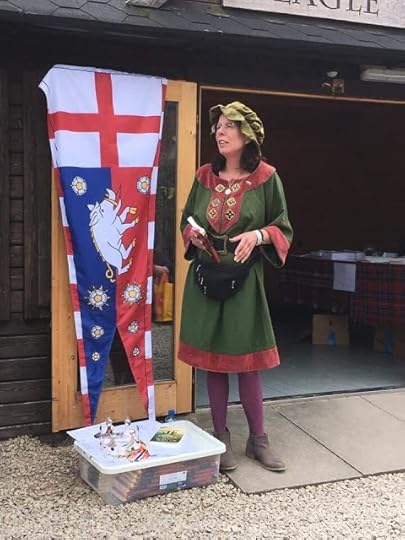 Alex reading at Bosworth, in not-very-authentic page costume!
Alex reading at Bosworth, in not-very-authentic page costume!Would I call in to Middleham Castle at a couple of days’ notice to cut the cake for King Richard at his 566th birthday party? Of course! Will I dress as a medieval page to give a talk to sixty schoolchildren? Why not? What about compiling an anthology of short fiction by a dozen international authors and publishing it in time for Christmas with proceeds going to charity? Hell, yes – when do I start?OK, that wasn’t a suggestion made to me, and to be honest, the idea had been sitting somewhere towards the rear of my brain for a while. Since I’d raised a few pounds for the charity Scoliosis Association UK (SAUK) through selling a short story online – a ghost story with a Richard III theme, that also featured a young impulsive lad, himself recently diagnosed with scoliosis... And then mentioned it to Wendy Johnson (of the Looking For Richard Project), herself a very talented writer, who told me she had also written a Ricardian short story or two. Two or three short stories on a theme? That’s the makings of an anthology, I joked!
 Wendy Johnson, with fellow members of the Looking For Richard Project: left to right, Dr David and Wendy Johnson, Philippa Langley and Dr John Ashdown-Hill; photo copyright Philippa Langley.
Wendy Johnson, with fellow members of the Looking For Richard Project: left to right, Dr David and Wendy Johnson, Philippa Langley and Dr John Ashdown-Hill; photo copyright Philippa Langley.But it was several months later, after a particularly energizing library talk when the subsequent discussion about King Richard went on a good hour after the intended time, that the idea resurfaced. And there were three months to go before Christmas – plenty of time to pull something together.Looking back it was probably total madness – the idea that anyone would want to contribute stories to such a tentative project by a newbie author, let alone in such a short time. Yet to my amazement, when I sent out a few feelers to other Ricardian authors I knew, or knew of, through Facebook and Twitter, every one of them said yes. Two also said ‘I know someone else who might contribute’ and ‘I think I know who could do the cover’, and another author I’d met briefly at a signing also got wind of the project and asked if she could join in. Suddenly I had fifteen pieces of short fiction generously promised by twelve different authors, from the UK, Ireland, the USA and Australia, several to be written specially – sufficient to make up a small collection that would be an ideal stocking filler – if it could be made ready in time for Christmas...
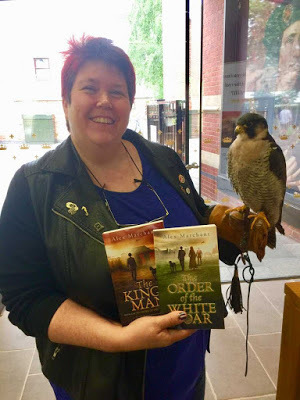 Australian contributor Narrelle M. Harris, with Pilgrim the peregrine
Australian contributor Narrelle M. Harris, with Pilgrim the peregrineand Alex’s books, at the King Richard III Visitor Centre, Leicester, June 2018.
So what was, one moment, just an impulsive idea became, within twenty-four hours, a definite plan. A plan for which eleven other authors were busy creating new tales, redrafting existing ones and, in a couple of cases, editing extracts from their novels to act as standalone pieces. Of course, as many another author will realize, all this was probably just another excuse for me to prevaricate over my work-in-progress...To cut short what will otherwise become a longer story than many in the anthology, thanks to the sterling efforts of my fellow contributors, we somehow managed to produce in good time before Christmas what has since been described by reviewers as ‘a highly entertaining read’, ‘a wonderful variety of stories’ with ‘a little something for everyone’, and ‘a rainbow of emotion and adventure’. And sales have already raised several hundred pounds for SAUK – chosen as the recipient charity because King Richard himself had scoliosis, as was revealed when his grave was rediscovered in 2012.
 Cover of Grant Me the Carving of My Name, image by Riikka Katajisto.
Cover of Grant Me the Carving of My Name, image by Riikka Katajisto.
 Benedict Cumberbatch reading
Benedict Cumberbatch reading Carol Ann Duffy’s ‘Richard’
Oh, and another couple of impulsive actions led to some celebrity input. What should the title be? My sister suggested a line from poet-laureate Carol Ann Duffy’s poem ‘Richard’, read by Benedict Cumberbatch at the king’s reburial in 2015 – ‘though I suppose you’d need permission’, she said. No problem – why don’t I fire off an email just on the off-chance? Within twelve hours the permission was given to entitle the anthology Grant Me the Carving of My Name. And how about asking a multi-million-selling historical novelist to provide a foreword? It’s worth a shot! And who better than Philippa Gregory, whose The White Queen, dramatized on the BBC in 2013, offers one of the few positive mainstream portrayals of King Richard?
 Philippa Gregory
Philippa GregoryAs Philippa writes in her Foreword, ‘This collection has come about – as so many good things do – from a dream and a joke.’ My story did in fact come about as a result of a between-sleeping-and-waking dream, but she could have said just as accurately ‘a joke and an impulse’. And it’s an impulse I’ve not regretted for an instant.*
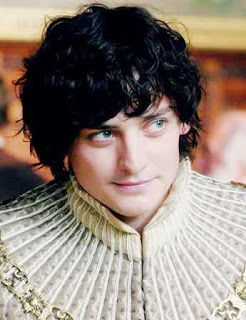 Aneurin Barnard as Richard III, from The White Queen
Aneurin Barnard as Richard III, from The White Queen
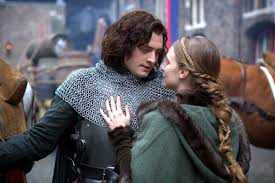
(*That’s so much the case, that plans are afoot to do it all again in 2019. Narrelle Harris wasn’t the only author to contact me about contributing a story after she heard about the anthology. After the line-up was finalized and the project announced, I had to regretfully say no to approaches from at least as many potential contributors as those I had initially asked. So a call for contributions to a second anthology will be appearing on my blog and Facebook page in a couple of months or so – allowing rather more time to compile it before Christmas this time, assuming enough authors are still interested. If you think you might be one, do keep an eye out...)
Grant Me The Carving Of My Name
 A boyhood mishap in York. A ghostly walking tour of Leicester. A deadly snowstorm on the moors above Middleham. Alien abduction in the very heart of the city of London. Loss of a beloved brother, death of an untrue cousin.Just some of the events recounted in these tales by authors inspired by King Richard III.Much-maligned since his death, the real man has often been lost in the shadow of the scheming villain of Shakespeare’s famous play. Following the rediscovery of his centuries-lost grave in 2012, many people have come to question this evil reputation, and King Richard’s supporters (known as Ricardians) are seizing the chance to bring his real history to a wider audience. The authors collected here have all, in their different ways, sought to cast a light on that story.Elegiac, mystical, brutal, light-hearted, uplifting. Will you find your new favourite author within the pages of this anthology?Sold in support of Scoliosis Association UK (SAUK) with a Foreword by Philippa Gregory (The White Queen) and edited by Alex MarchantWith contributions from:Narrelle M. Harris • Wendy Johnson • Susan Lamb • Joanne R. Larner • Matthew Lewis • Máire Martello • Frances Quinn • J. P. Reedman• Marla Skidmore • Richard Unwin • Jennifer C. Wilson
A boyhood mishap in York. A ghostly walking tour of Leicester. A deadly snowstorm on the moors above Middleham. Alien abduction in the very heart of the city of London. Loss of a beloved brother, death of an untrue cousin.Just some of the events recounted in these tales by authors inspired by King Richard III.Much-maligned since his death, the real man has often been lost in the shadow of the scheming villain of Shakespeare’s famous play. Following the rediscovery of his centuries-lost grave in 2012, many people have come to question this evil reputation, and King Richard’s supporters (known as Ricardians) are seizing the chance to bring his real history to a wider audience. The authors collected here have all, in their different ways, sought to cast a light on that story.Elegiac, mystical, brutal, light-hearted, uplifting. Will you find your new favourite author within the pages of this anthology?Sold in support of Scoliosis Association UK (SAUK) with a Foreword by Philippa Gregory (The White Queen) and edited by Alex MarchantWith contributions from:Narrelle M. Harris • Wendy Johnson • Susan Lamb • Joanne R. Larner • Matthew Lewis • Máire Martello • Frances Quinn • J. P. Reedman• Marla Skidmore • Richard Unwin • Jennifer C. WilsonGrant Me the Carving of My Name is available through Amazonat mybook.to/GrantMetheCarving or direct from Alex.
The Order of the White Boar
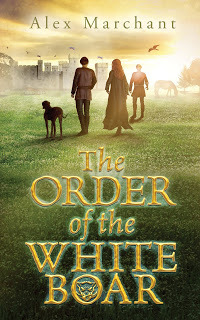 How well do you know the story of King Richard III? Not as well as Matthew Wansford.Twelve-year-old Matthew Wansford has always longed to be a knight. And his chance comes in the golden summer of 1482 when he arrives at Middleham Castle, to serve the King’s brother, Richard, Duke of Gloucester.Soon he encounters a dangerous enemy. Hugh, a fellow page, is a better swordsman, horseman, more skilled in all the knightly arts – and the son of an executed traitor. Now he aims to make Matt's life hell.Yet Matt also finds the most steadfast of friends – Alys, Roger and Edward, the Duke’s only son. Together they forge a secret knightly fellowship, the Order of the White Boar, and swear an oath of lifelong loyalty – to each other and to their good lord, Duke Richard.But these are not times to play at war. Soon Matt and his friends will be plunged into the deadly games of the Wars of the Roses. Will their loyalty be tested as the storm looms on the horizon?
How well do you know the story of King Richard III? Not as well as Matthew Wansford.Twelve-year-old Matthew Wansford has always longed to be a knight. And his chance comes in the golden summer of 1482 when he arrives at Middleham Castle, to serve the King’s brother, Richard, Duke of Gloucester.Soon he encounters a dangerous enemy. Hugh, a fellow page, is a better swordsman, horseman, more skilled in all the knightly arts – and the son of an executed traitor. Now he aims to make Matt's life hell.Yet Matt also finds the most steadfast of friends – Alys, Roger and Edward, the Duke’s only son. Together they forge a secret knightly fellowship, the Order of the White Boar, and swear an oath of lifelong loyalty – to each other and to their good lord, Duke Richard.But these are not times to play at war. Soon Matt and his friends will be plunged into the deadly games of the Wars of the Roses. Will their loyalty be tested as the storm looms on the horizon? Amazon
The King’s Man
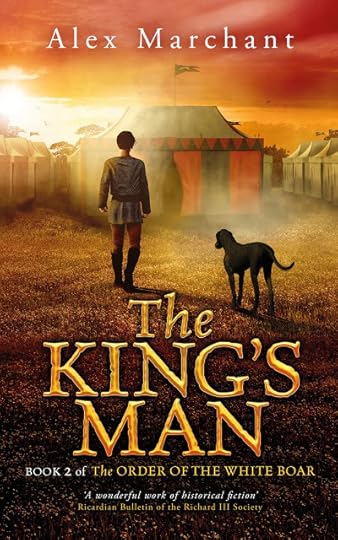 How well do you know the story of the real King Richard III?It's April 1483, and the death of his brother King Edward IV has turned the life of Richard, Duke of Gloucester upside down, and with it that of his 13-year-old page Matthew Wansford.Banished from Middleham Castle and his friends, Matt must make a new life for himself alone in London. But danger and intrigue lie in wait on the road as he rides south with Duke Richard to meet the new boy king, Edward V – and new challenges and old enemies confront them in the city.As the Year of the Three Kings unfolds – and plots, rebellions, rumours, death and battles come fast one upon the other – Matt must decide where his loyalties lie.What will the future bring for him, his friends and his much-loved master? And can Matt and the Order of the White Boar heed their King’s call on the day of his greatest need?The King’s Man, the eagerly awaited sequel to The Order of the White Boar, continues the story of Richard Plantagenet for readers aged 10 to 110
How well do you know the story of the real King Richard III?It's April 1483, and the death of his brother King Edward IV has turned the life of Richard, Duke of Gloucester upside down, and with it that of his 13-year-old page Matthew Wansford.Banished from Middleham Castle and his friends, Matt must make a new life for himself alone in London. But danger and intrigue lie in wait on the road as he rides south with Duke Richard to meet the new boy king, Edward V – and new challenges and old enemies confront them in the city.As the Year of the Three Kings unfolds – and plots, rebellions, rumours, death and battles come fast one upon the other – Matt must decide where his loyalties lie.What will the future bring for him, his friends and his much-loved master? And can Matt and the Order of the White Boar heed their King’s call on the day of his greatest need?The King’s Man, the eagerly awaited sequel to The Order of the White Boar, continues the story of Richard Plantagenet for readers aged 10 to 110Amazon US Amazon UK
Alex MarchantBorn and raised in the rolling Surrey downs, and following stints as an archaeologist and in publishing in London and Gloucester, Alex now lives surrounded by moors in King Richard III’s northern heartland, working as a freelance copyeditor, proofreader and, more recently, independent author of books for children aged 10+.
Published on January 13, 2019 23:00
January 11, 2019
#BookReview — The Last Plantagenet?: A Ricardian Romance, by Jennifer C. Wilson #Medieval #Romance @inkjunkie1984
 The Last Plantagenet?A Ricardian RomanceBy Jennifer C. Wilson
The Last Plantagenet?A Ricardian RomanceBy Jennifer C. Wilson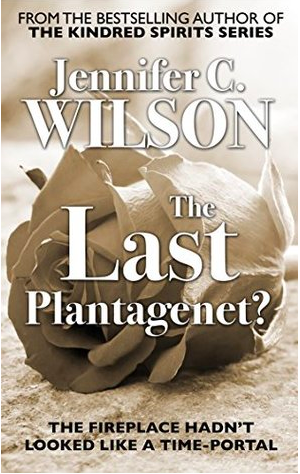
The fireplace hadn't looked like a time-portal.
All Kate had wanted was a fun, relaxing day out, watching the knights jousting at Nottingham Castle. What she ended up with was something quite different.
Transported in a heartbeat from 2011 to 1485, how will Kate handle life at the Ricardian court? Even more importantly, how will she cope when she catches the eye of the king himself?

A passionate story set in the time of King Richard III.
The pounding of hooves, the smell of medieval food roasting over a spit and the warmth of the mulled wine, was Kate’s idea of a Saturday afternoon well spent. Kate had always loved watching re-enactments, especially when Richard III was centre stage as he was on this, the most ordinary of days. If it had not been for the summer storm, Kate would have lingered outside, enjoying the atmosphere. Instead, Kate found herself admiring the kitchen’s grand fireplace. Kate could remember hearing a clap of thunder but after that, the world went dark and things became a little complicated…
From a warm summer day watching the joust to all the intrigue of life at Richard III’s court The Last Plantagenet?: A Ricardian Romance by Jennifer C Wilson is an irresistible romance between the last Plantagenet monarch and a thoroughly modern-day young woman.
I am sure many historians have dreamed about going back in time and instead of reading about the events from a dusty old history book, actually watching them unfold. Kate’s reaction to finding herself in the 15th Century was plausible and totally believable.
I found myself drawn into this wonderfully romantic story from the opening sentence. I adored the characterisation of Kate. Kate’s confusion, but also her excitement, at finding herself in Richard’s court, along with her strong reaction to him was beautifully narrated. Their relationship was incredibly passionate, not to mention believable. The Last Plantagenet? A Ricardian Romance certainly left me mesmerised.
Wilson has a very elegant turn of phrase which makes this book immensely readable. The descriptions of the Court of Richard III — from the tapestries on the wall to the food upon the table — was very vivid in the telling. Wilson has obviously spent many hours researching this era, for only a scholar with a great understanding could bring such riches back to life.
I thought Wilson’s portrayal of Richard was fair, and I was delighted to see that it was not at all swayed by the Tudor propaganda which has maligned Richard’s name for centuries. Wilson’s Richard is a good king, a fair one. He is not a fairy-tale prince, not by any means, and Kate does not meet her happy ever after, but there is a light at the end of the tunnel. I am not going to give away any spoilers, but the ending certainly made me smile.
Although short, this novella is rich in historical detail, and the romance was undoubtedly swoon-worthy. Wilson has balanced both the modern world and the medieval one with great skill and diligence. This book is perfect for a long lingering coffee break.
I Highly Recommend.
Review by Mary Anne Yarde.
The Coffee Pot Book Club.
Amazon UK • Amazon US
Jennifer C. Wilson
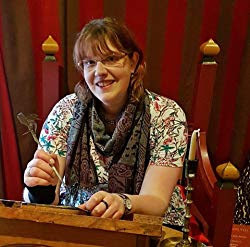 Jennifer is a marine biologist by training, who developed an equal passion for history whilst stalking Mary, Queen of Scots of childhood holidays (she since moved on to Richard III). She completed her BSc and MSc at the University of Hull, and has worked as a marine environmental consultant since graduating.
Jennifer is a marine biologist by training, who developed an equal passion for history whilst stalking Mary, Queen of Scots of childhood holidays (she since moved on to Richard III). She completed her BSc and MSc at the University of Hull, and has worked as a marine environmental consultant since graduating. Enrolling on an adult education workshop on her return to the north-east reignited Jennifer’s pastime of creative writing, and she has been filling notebooks ever since. In 2014, Jennifer won the Story Tyne short story competition, and also continues to work on developing her poetic voice, reading at a number of events, and with several pieces available online. Her Kindred Spirits novels are published by Crooked Cat Books, alongside a self-published timeslip novella.
She is also a co-founder and host of the award-winning North Tyneside Writers' Circle, and has hosted various events and workshops across the Tyneside area.
Connect with Jennifer: Website• Twitter • Goodreads• Amazon Author Page.
Published on January 11, 2019 23:30
#BookReview — Days of Sun and Glory: The King’s Greatest Enemy #2 by Anna Belfrage #HistoricalFiction #HistoricalRomance @abelfrageauthor
 Days of Son and GloryThe King's Greatest Enemy #2By Anna Belfrage
Days of Son and GloryThe King's Greatest Enemy #2By Anna Belfrage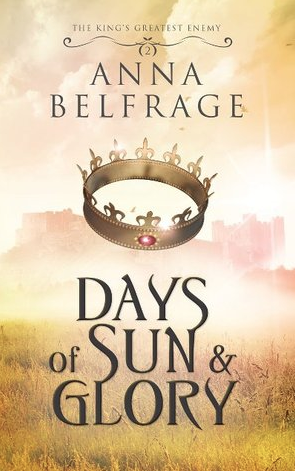
Adam de Guirande has barely survived the aftermath of Roger Mortimer’s rebellion in 1321. When Mortimer manages to escape the Tower and flee to France, anyone who has ever served Mortimer becomes a potential traitor – at least in the eyes of King Edward II and his royal chancellor, Hugh Despenser. Adam must conduct a careful balancing act to keep himself and his family alive. Fortunately, he has two formidable allies: Queen Isabella and his wife, Kit. England late in 1323 is a place afflicted by fear. Now that the king’s greatest traitor, Roger Mortimer, has managed to evade royal justice, the king and his beloved Despenser see dissidents and rebels everywhere – among Mortimer’s former men, but also in the queen, Isabella of France.
Their suspicions are not unfounded. Tired of being relegated to the background by the king’s grasping favourite, Isabella has decided it is time to act – to safeguard her own position, but also that of her son, Edward of Windsor. As Adam de Guirande has pledged himself to Prince Edward he is automatically drawn into the queen’s plans – whether he likes it or not.
Yet again, Kit and Adam are forced to take part in a complicated game of intrigue and politics. Yet again, they risk their lives – and that of those they hold dear – as the king and Mortimer face off. Once again, England is plunged into war – and this time it will not end until either Despenser or Mortimer is dead.
Days of Sun and Glory is the second in Anna Belfrage’s series, The King’s Greatest Enemy, the story of a man torn apart by his loyalties to his lord, his king, and his wife.

Everyone knows that you cannot serve two masters…
These are dangerous times. After the failed rebellion, led by Sir Roger Mortimer, King Edward II is determined to see those who took part brought to justice. With the help of his most loyal and trusted Chancellor, Hugh Despenser, these traitors will be held to account for their villainous deeds. No one is safe from the wrath of the King. Not even the Queen.
Adam de Guirande walks on a narrow path. He played his part in the Mortimer Rebellion and, thanks to Despenser, he has the scars to prove it. Adam is one of the fortunate ones — he walked away with his life — for now, at least. But with Despenser tightening the noose, it will be a miracle if Adam comes out of this adventure alive. However, Adam has a powerful ally — Queen Isabella, Edward’s slighted wife.
Kit, Adam’s wife, wishes that things were different. She almost lost her husband once to Despenser’s cruelty, and now she must face the prospect of doing so again. However, this time it will be different. Where Adam goes, Kit is also determined to go, no matter what the consequences.
Nothing is what it seems in Edward’s court, and Edward is right to fear for his life and his throne. However, what Edward fails to understand is that the disenchantment and the whispered threats of rebellion would be quelled if only he were to rid himself of the Despensers. Hugh Despenser, like his father before him, craves power. He is insatiable. He takes what is not his and destroys anyone who gets in his way. The nobles will only put up with so much. If Edward does not do something to curb Despenser’s appetite, they will. And if that means usurping Edward from his throne, then so be it.
With crystalline prose, vivacious storytelling and a plot that seems to get better and better, Days of Sun and Glory: The King’s Greatest Enemy #2 by Anna Belfrage is a compelling account of one family as they try to navigate the latter part of Edward II reign.
From the fearful and dangerous court of Edward II to the elegance and grandeur of King Charles’ Château de Vincennes, this is a book that is impossible to put down. This is a book that screams to be read in one sitting.
What I love about Belfrage’s style of writing is that she seems to have an intuitive understanding of what makes a historical fiction book worth reading. Within the pages of this remarkable book is the story of a King who is as weak as he is foolish. A Queen who is as beautiful as she is devious. And a family who finds themselves stuck in the middle. There can be no doubt that Belfrage is a master storyteller. She has brought this era wonderfully back to life with all the integrity that such a tale deserves. I was immediately drawn into the world of Adam and Kit de Guirande. Theirs is a world filled with danger and uncertainty. The only thing that is certain is their love for one another.
I adored the characterisation of Adam. He is torn between his old master, Roger Mortimer, and his new one, Prince Edward. He is a man of integrity, and I could not help but like him. The same can be said for Kit, who longs to go home and live a simple life with her family, but at the same time, she is determined to stay with Adam no matter what the consequences.
I thought the portrayal of the young Prince Edward is very much worthy of note. Belfrage describes how Prince Edward was used as a political pawn, caught in the middle of his parent’s selfish ambitions. Prince Edward’s despair was heart-breaking. He just wants his family to be united. But as history tells us, that was not to be. As the plot thickens, Edward matures, and he begins to look at things with a king’s perspective. Those who manipulated and sought to influence him would one day have to answer for their crimes. Belfrage is the ideal commentator for Prince Edward’s story.
I would recommend Days of Sun and Glory to anyone looking for their next great historical fiction read, or indeed, for anyone interested in this era of history.
I Highly Recommend.
Review by Mary Anne Yarde.The Coffee Pot Book Club.
<!-- /* Font Definitions */ @font-face {font-family:Times; panose-1:2 0 5 0 0 0 0 0 0 0; mso-font-charset:0; mso-generic-font-family:auto; mso-font-pitch:variable; mso-font-signature:3 0 0 0 1 0;} @font-face {font-family:"MS 明朝"; mso-font-charset:78; mso-generic-font-family:auto; mso-font-pitch:variable; mso-font-signature:1 134676480 16 0 131072 0;} @font-face {font-family:"MS 明朝"; mso-font-charset:78; mso-generic-font-family:auto; mso-font-pitch:variable; mso-font-signature:1 134676480 16 0 131072 0;} @font-face {font-family:Cambria; panose-1:2 4 5 3 5 4 6 3 2 4; mso-font-charset:0; mso-generic-font-family:auto; mso-font-pitch:variable; mso-font-signature:-536870145 1073743103 0 0 415 0;} @font-face {font-family:Garamond; panose-1:2 2 4 4 3 3 1 1 8 3; mso-font-charset:0; mso-generic-font-family:auto; mso-font-pitch:variable; mso-font-signature:3 0 0 0 1 0;} /* Style Definitions */ p.MsoNormal, li.MsoNormal, div.MsoNormal {mso-style-unhide:no; mso-style-qformat:yes; mso-style-parent:""; margin:0cm; margin-bottom:.0001pt; mso-pagination:widow-orphan; font-size:12.0pt; font-family:Cambria; mso-ascii-font-family:Cambria; mso-ascii-theme-font:minor-latin; mso-fareast-font-family:"MS 明朝"; mso-fareast-theme-font:minor-fareast; mso-hansi-font-family:Cambria; mso-hansi-theme-font:minor-latin; mso-bidi-font-family:"Times New Roman"; mso-bidi-theme-font:minor-bidi;} a:link, span.MsoHyperlink {mso-style-priority:99; color:blue; mso-themecolor:hyperlink; text-decoration:underline; text-underline:single;} a:visited, span.MsoHyperlinkFollowed {mso-style-noshow:yes; mso-style-priority:99; color:purple; mso-themecolor:followedhyperlink; text-decoration:underline; text-underline:single;} p {mso-style-priority:99; mso-margin-top-alt:auto; margin-right:0cm; mso-margin-bottom-alt:auto; margin-left:0cm; mso-pagination:widow-orphan; font-size:10.0pt; font-family:Times; mso-fareast-font-family:"MS 明朝"; mso-fareast-theme-font:minor-fareast; mso-bidi-font-family:"Times New Roman";} .MsoChpDefault {mso-style-type:export-only; mso-default-props:yes; font-family:Cambria; mso-ascii-font-family:Cambria; mso-ascii-theme-font:minor-latin; mso-fareast-font-family:"MS 明朝"; mso-fareast-theme-font:minor-fareast; mso-hansi-font-family:Cambria; mso-hansi-theme-font:minor-latin; mso-bidi-font-family:"Times New Roman"; mso-bidi-theme-font:minor-bidi;} @page WordSection1 {size:612.0pt 792.0pt; margin:72.0pt 90.0pt 72.0pt 90.0pt; mso-header-margin:36.0pt; mso-footer-margin:36.0pt; mso-paper-source:0;} div.WordSection1 {page:WordSection1;} </style></span></span></div><br /><div style="text-align: center;"><span style="font-family: "garamond"; font-size: 28pt;"><a href="https://www.amazon.co.uk/gp/product/1... UK</a> • <a href="https://www.amazon.com/Days-Sun-Glory... US</a></span></div><span style="font-family: "garamond"; font-size: 30pt;"><span style="color: #bf9000;"><span style="font-family: "garamond"; font-size: 30pt;"><span style="color: #bf9000;"><br /></span></span>Anna Belfrage</span><o:p></o:p></span><br /><div class="MsoNormal"><br /></div><span style="font-size: 16pt;"></span><br /><br /><div class="separator" style="clear: both; text-align: center;"><a href="https://4.bp.blogspot.com/-MHaeyXOwJU..." imageanchor="1" style="clear: left; float: left; margin-bottom: 1em; margin-right: 1em;"><img border="0" data-original-height="200" data-original-width="200" height="200" src="https://4.bp.blogspot.com/-MHaeyXOwJU..." width="200" /></a></div><div class="MsoNormal"><span style="font-family: "garamond"; font-size: 16pt;">Had Anna been allowed to choose, she’d have become a time-traveller. As this was impossible, she became a financial professional with two absorbing interests: history and writing. Anna has authored the acclaimed time travelling series The Graham Saga, set in 17<sup>th</sup> century Scotland and Maryland, as well as the equally acclaimed medieval series The King’s Greatest Enemy which is set in 14<sup>th</sup> century England. She has recently released the first in a new series, The Wanderer. This time, she steps out of her normal historical context and A Torch in His Heart is with a fast-paced contemporary romantic suspense with paranormal and time-slip ingredients.</span><br /><span style="font-family: "garamond"; font-size: 16pt;"><br /></span></div><br /><div class="MsoNormal"><span style="font-family: "garamond"; font-size: 16pt;">Find out more about Anna by visiting her <a href="http://www.annabelfrage.com/">..., or her<a href="http://author.to/ABG">Amazon page.</a></span></div>
Published on January 11, 2019 23:00
January 10, 2019
Short-Story – Legends Of The Vikings: A King's Destiny, by Kevin McAllister #amwriting #Historical #Viking @GoingViking
Legends of the Vikings:A King's Destiny By Kevin McAllister

A father fights for his family. A king fights for his people. Both types of men should be approached cautiously, especially when they are one and the same. When a legend has conquered his dreams, all he needs to do is to protect it.
As Magnus sits alone high in the snowy mountains overlooking the village, he stares into the burning flames in deep thought. His fame and achievements don’t just come from the treasure or the songs written from his battles but is displayed by the peace in his kingdom. However, internal troubles are bothering him. The smell of battle loafs in the air. The gods are stirring in the icy breeze. He recalls the seer’s prophesy of fire and sword. Is it looming now?King Magnus, his wife Áshildr, and their two children stand ready looking out into the large group of people in the great hall. In the dim lit brisk setting, men and women are seen holding large horns of mead and wearing furs across their back to keep warm. All eyes in the audience are on the family anticipating what the king has to deliver. With a loud booming voice Magnus states, “our continuous efforts prove to be bountiful in our goal of unity throughout Norway. Once spring arrives, our people along with our new alliances we have formed, will sail to the west to expand our settlements and continue our path towards peace with the Christians. I believe they may be out of silver to give anyway!” The crowd bursts with laughter of the thought of their successful raids in the past. “Now enjoy yourselves and drink! Skál!” shouts Magnus.The luminescent moon shines over the merry villagers as horns are emptied and men are frolicking with the women after the gathering in the great hall. In the bed chambers, sits Magnus hunched over sharpening his sword on a wet stone. He appears shirtless, with multiple battle wounds and scars on his back. He may seem like he has everything under control on the outside, but internally he fights this impending doom that he feels is coming. His wife, Áshildr enters the room and walks over to her husband laying a soft gentle hand on his shoulder. “What’s wrong husband?” asks Áshildr. Magnus says nothing, just continues to sharpen his sword. After a short pause, Áshildr kneels in front of him and lays her palm on top of the sword to indicate that she wants his focus. “Talk to me Magnus,” says Áshildr in her calm, but authoritative tongue. Magnus perks up like he hasn’t heard a single thing she has said. “Oh, I was just in deep thought. What do you ask of me?” Magnus states, with now full attention on his wife. Áshildr cups his grizzly face with both of her hands as she intently looks into his aged eyes. “A battle is coming. The gods have spoken, and I have heard their words. This may be the end, the end of me and everything I hold dear,” Magnus explains with a stern, but comfort tone. Áshildr knows very well what he is saying and after a brief pause to collect her thoughts and feelings, she accepts what the gods may have in store for her husband. She slowly leans in closer and begins to kiss Magnus with raw passion. Áshildr gives a firm push to her husband’s chest sending him backwards onto the bed. She pulls her dress off and gradually climbs up on the bed to straddle her husband. Magnus quickly kicks off his trousers and pulls his tunic over his head, throwing it behind him. The candle lit backdrop provides a romantic setting between a husband and wife, knowing that it could be their last night together.A man labeled a warrior coming from the east, has nothing to lose. The tales have been heard far and wide across Scandinavia about the Thief of Peace. He goes from village to village striking down the petty kings. Not for fame or wealth, just pure anarchy. Sometimes the kill is stealthy when not one person sees the tragic act; other times it is a man versus man battle for everyone to witness. After each king is slain, he quickly takes his sword and with one smooth slice, the Thief of Peace collects their head as trophies. Fury, revenge, and destruction consume his mind and he sets his eyes on one goal.His tales are never consistent. People provide a different point of view every time his name is spoken. Some say he is a foreigner from a faraway land. Others say, he is a true berserker providing Odin with more men for Ragnarök. He has also been called a god, but no one truly knows his origin or why he causes chaos in their land. At least they haven’t lived long enough to tell it.“In my land many years ago, a group of you attacked my home. Silver wasn’t important to my family, as we had none. It didn’t matter though, because you struck down my mother and father right in front of my youthful eyes. See, my father hid me in the bushes to keep me safe knowing he was going to pay a price. The thing is, I remember that day clear, just like the day I took my own oath. To kill every last one of you and punish the man you think is king,” the Thief of Peace declares as he slits the neck of a dying man. In the background, bodies are piled up and blood flows like a river down to his feet. Another village slaughtered, as he continues his destructive path of taking the one thing away people take for granted, peace.Spring has arrived as the snow begins to drip off the trees. Magnus and his son, Einar watch as a fleet of long ships sail off in the distance heading west. “How long will they be?” Einar curiously asks. “As long as necessary. Our sacrifice to Thor last night will provide them with great protection over the seas,” Magnus says calmly. They both stand watch, until the sails can no longer be seen.During their early morning hunt, Magnus spots a small gray rabbit hopping around on the wet soft grass looking for food. The creature stops with both ears pointed up, while searching the area by smell and sound. The bow string snaps, sending the broadhead arrow to penetrate the skin of the rabbit killing it instantly. The blood begins to spread from the contact point on the fur of the rabbit. With a grin on his face, Einar turns to his dad and asks, “how’s that father?” Magnus slaps his sons’ back in celebration for the kill. “That’s my boy. Just remember to always breathe. Look at the difference it made with your shot from last time.” After collecting their kill, they begin to head home through the woods. “Do you think mother will cook this for me?” Einar asks looking up toward his father. As Magnus looks down, he realizes how far his son is away from being a man. “She would, however you need to learn how to cook your own meat son. What happens when I, nor your mother is around? You need to learn the simple things in life. One day, this rabbit could be life or death for you,” Magnus explains as he kneels down to be on the same level as his son.Back at home, people are seen fishing off the docks and strolling through the market place looking to trade. More ships are being built and swords are being constructed. The village is busy and thriving. Áshildr and her daughter, Hervor are walking hand in hand through the village greeting everyone as they walk by. The little girl pans over to a group of obnoxious men drinking together. “Mother?” asks Hervor. “Yes honey?” replies Áshildr. “Why is everyone so loud when they drink?” Hervor asks in a childish manner. “Oh darling, that just means they are having a good time. That’s all,” Áshildr explains delicately. Hervor keeps walking satisfied by the answer her mother gave her.A man standing on the docks looking out into the water, blows a large horn that echoes and ricochets off the mountains, and travels throughout the village. It is a warning signal for potential invaders. Magnus and Einar are almost out of the woods, when they hear the horn go off. The king has a curious, but stern look on his face. His long gray beard falls to his breastbone. He takes a firm grasp of the hilt of his sword and looks toward his son. “We need to go now!” Men and women throughout the village grab their swords and shields and race off to the docks. Archers stand ready covering the perimeter. Magnus is running as fast as he can, while his son trails behind. He glances back at Einar and shouts, “you need to find your mother and sister. Stay with them until I find you. Understand?” Einar is breathing hard trying to catch up to his father and acknowledges his father by a simple head nod. “Remember what I told you,” Magnus shouts at his son while he continues to run. A one-person longboat is seen ahead coming down the fjord. Magnus can’t seem to make out exactly what’s on the boat due to the dense fog hovering the water. As the boat inches closer, gasps are heard from the village. Clenching his fist and raising his sword, Magnus moves forward recognizing each king he sees. Several heads are dangling from the boat where the sail would hang. Decapitated from their bodies, the heads droop with blank eyes staring toward the village. With everyone’s gaze on the boat, it suddenly catches on fire. The flames rise high above the heads, slowly melting the corpse’s skin right off the faces. Magnus closes his eyes for a split-second listening for wisdom from Odin. Fire and sword, fire and sword.THE END Kevin McAllister
 Kevin McAllister (1991 - ) is the creator of Going Viking, a community for people to connect and share all things relating to the Viking Age. He currently resides in Virginia, with his expecting wife and two children. He was born in New Jersey and raised in Green Bay, Wisconsin and received his Bachelor’s Degree in Computer Network and Security at Wilmington University. From personal research and the motivation to expand his knowledge, he continues to pursue history. His passion for the Viking Age has ignited a hopeful entry into the writing world with his first short story Legends of the Vikings: A King’s Destiny, written in 2018.
Kevin McAllister (1991 - ) is the creator of Going Viking, a community for people to connect and share all things relating to the Viking Age. He currently resides in Virginia, with his expecting wife and two children. He was born in New Jersey and raised in Green Bay, Wisconsin and received his Bachelor’s Degree in Computer Network and Security at Wilmington University. From personal research and the motivation to expand his knowledge, he continues to pursue history. His passion for the Viking Age has ignited a hopeful entry into the writing world with his first short story Legends of the Vikings: A King’s Destiny, written in 2018. For more information, visit his Website • Twitter
Published on January 10, 2019 23:00
January 9, 2019
Life in the time of Catherine Parr by Trisha Hughes #History #Tudors @TrishaHughes_
Life in the time of Catherine ParrBy Trisha Hughes

When you look at the six marriages of Henry VIII, Catherine Parr, or Kateryn as she preferred to be called, sounds dull and uninteresting. Her story lacks the intense passion of both Anne Boleyn and her cousin Catherine Howard, the quiet, heroic strength of Catherine of Aragon, the romance of Jane Seymour and the political intrigue of Anne of Cleves. What wife number six of Henry is most famous for however is simply surviving. This blue-blooded, twice-widowed, patient woman nursed the sick, aged, irritable king through the final, painful years of his life when he was swollen to the point of bursting. The handsome man who in his youth had led armies, excelled in jousts and hunts, had become so bloated he could barely move and out of his large face with double chins glowed small piggish eyes. But as boring as her marriage may appear, Kateryn’s story is much more complicated than it sounds.
At the time of Kateryn’s marriage to Henry, the hostility between England and Scotland still smouldered along the border. When James V’s mother (Henry’s sister Margaret) died, the smouldering flickered once more into flame. The Scots made an alliance with France and defeated the English at Halidon Hill only to lose nearly 10,000 men under the Duke of Norfolk’s attack. Then when news came that at the second battle, James V was killed leaving the kingdom to an infant of one week, Mary Queen of Scots, Henry was so jubilant.
Kateryn arrived on the scene one year after Catherine Howard’s two years of wedded bliss to Henry came to an abrupt halt. Marriage number five to Catherine suggests a kind of challenge for Henry. He had felt rejuvenated by nights spent with the teenager but on 13th February, after being charged with treason and adultery and waiting a year in limbo, Catherine climbed the scaffold, looking pale and terrified, and made a speech describing her punishment as “worthy and just”.Her final words were “I die a Queen, but I would rather have died the wife of Culpeper.”
Henry did not attend the execution. Instead, he locked himself away in Hampton Court for days on end mixing remedies from his royal herb garden to try and heal his festering leg. By this time in his reign, Henry had begun eating so much that his bed had to be enlarged to a width of seven feet. Henry had developed a binge-eating habit consisting of a diet of fatty red meats and very few vegetables. His weight had ballooned even more and he was covered in pus-filled boils and suffered from gout. No wonder he had mood swings and a lousy temperament.
Through all of this, it’s understandable that a depression hung over him. But Henry still longed for female companionship and one year after Catherine Howard’s execution, he stood confidently before Kateryn Parr and proposed marriage to the serious little 32-year-old widow. And he fully expected her to swoon with delight.
It was a definite improvement in Kateryn’s current status as lady-in-waiting to Henry’s daughter Mary but her own credentials weren’t too bad either. Through her father, Kateryn was a descendant of Richard Neville who was himself the grandson of John of Gaunt, Edward III’s son. She had fine clothes, beautiful jewels and a clever wit. She was in many ways an excellent choice to be England’s first lady, or so Henry thought, and he regarded himself very experienced in such matters.
Kateryn asked Henry for time to consider his proposal but really, it wasn’t like she could turn him down. He was after all Henry Tudor, King of England, notorious for his quick temper and sly mood swings and anyone who dared deny him what he wanted would see the inside of the Tower before losing their head pretty soon afterwards.
Kateryn would have looked up at the huge man standing before her, as round as he was tall, and seen a sallow 51-year-old man with thinning hair who still thought of himself as a handsome virile young man, a golden-haired God almost, riding and jousting with the best of them, with not a woman in all of England who could resist him. She would have seen swollen lips smiling wetly down at her, not quite hiding his yellow decaying teeth and foul breath, sharp little eyes almost hidden under his fat eyelids and she would have known the reason why he leant heavily on one leg. His other leg was bandaged not quite hiding the yellow pus that bubbled into the dressing and not quite disguising the horrible odour the wound emitted. She would have dreaded the moment he would bend down to kiss her and she would have wondered how she could ever escape. She was, after all, still in mourning after the death of her second husband but more importantly, she was desperately in love with Thomas Seymour, Jane’s brother, and she fully expected to marry him after the suitable mourning period had elapsed. So, what Henry saw as happiness at his marriage proposal was actually the radiance of a woman in love…for Thomas Seymour.
She showed little enthusiasm at Henry’s offer of marriage, (she had after all watched the number of heads falling), but in the end, she had no other choice than to accept him. Perhaps she would have felt like shuddering as she smiled modestly back at Henry and she perhaps she would have known that she was gambling with her life. Instead, she kept her silence. Henry on the other hand was so jubilant that all the heaviness of his past wives left him.
From the beginning of the marriage, Kateryn made an attempt to be a good wife. Her face was always wisely masked with concern for Henry and she kept her eyes filled with affection for her husband. She was experienced in nursing cranky old men as she had already nursed two previous husbands on their deathbeds so she knew what was expected of her. The brilliant young, handsome king had grown old and wrathful in his advancing years. The constant pain in his leg made him bad-tempered with anyone who crossed him and at all times, people weighed up replies to his questions, never sure if he would change his opinion at a moment’s notice. It was much safer to simply agree with him on everything.
So she nursed Henry’s stinking ulcerated leg that grew steadily worse and rubbed balms on them to relieve the pain for the four years of their marriage until his death. In her relations with Henry, Kateryn was young enough to interest him sexually and mature enough to perceive and cater to his other needs. Dressing his suppurating sores can’t have been pleasant and diverting his attention from his pain with stimulating conversation must have been mentally taxing.
But she went further than that. She reconnected Henry with his children, whom he rarely saw. In 1544, living in various royal manors, were Mary aged 28, Elizabeth aged 11 and Edward aged 7. The girls had both been bastardised and were excluded from the court, while Edward, as the sole heir, was kept far away from the plague-ridden capital of London for safety. Kateryn set out to be the means of drawing the royal family together and within a few months she had arranged for Henry’s children to pay visits to their father and thus provide him with some semblance of the home life he had never had before. Letters written between 1544 and 1547 bear witness to a very warm relationship between the royal children and their stepmother. Whether sending a court musician to perform for Mary or correcting the Latin exercises of Edward and Elizabeth, Kateryn took a keen interest in their wellbeing.
There was a time in the summer of 1546 however when Kateryn came within a whisper of being executed for her faith. She had been brought up as a Catholic but had become secretly sympathetic to, and interested in, the “New Faith”. But Bishop Gardiner of Winchester had his ear pressed firmly against the walls and he was aware of everything going on at court, no matter how covert. And he was growing increasingly anxious as the end of Henry’s reign drew nigh.
By then, Henry was a semi-invalid in constant pain from the festering sores on his legs and was only able to move with the aid of servants and Kateryn. Everyone knew what no one dared to say – the king’s days were numbered – and Bishop Gardiner, plus leading councillors, were discreetly making plans for the accession of Prince Edward, still a minor. If the prince’s uncle, Edward Seymour, grabbed the reins of power, England would be carried further along the road of religious reform and that, Gardiner believed, he needed to prevent from happening at all costs.
Everyone was fully aware of Kateryn’s past romance with Thomas Seymour and hadn’t she already placed herself in favour with Edward? Thus a campaign was launched against Kateryn using a formula that had been well tried in the past. They brought to trial a notoriously outspoken heretic by the name of Anne Askew and subjected her to fierce and unprecedented torture, breaking bones and dislocating limbs, and promised that her suffering would end if she would but name members of the royal court (including the queen) who shared her heretical beliefs.
Had they succeeded, Henry would probably have sanctioned a thorough search of Kateryn’s quarters, which might have revealed copies of William Tyndale’s English New Testament and other banned books. But Anne Askew did not break under pressure and Kateryn was warned of the plot by her physician, Robert Huick, who ‘found’ a paper revealing the scheme.
Perhaps, the discovery was engineered by Henry himself who had never lost his sense of theatre. Either way, Kateryn was smart enough to hasten to Henry’s chamber and throw herself on his mercy, thus enabling him to make a great show of support and affection for his wife.
For the traditionalists, this was the last throw of the dice. Their failure left the advocates of reform in power when Henry eventually breathed his last. Kateryn Parr, therefore, holds an important place in the history of the English Reformation.
We may hope that Kateryn was aware of this fact and took satisfaction from it, especially after her years of silent service to Henry and particularly because the brief remainder of her life was decidedly tragic. She was, at last, able to marry her true love, Thomas Seymour, but it did not bring her happiness. The wedding was a clandestine ceremony performed six months after Henry’s death and it was one that caused a small scandal.
The Seymour clan proceeded to tear itself apart in rivalries and competing ambitions and Thomas, having not been granted a place on the Regency Council as he had hoped by his brother, Edward Seymour now Lord Protector and Duke of Somerset, tried to ingratiate himself with the young king and to undermine the influence of his elder brother. Edward Seymour’s wife, Anne, also had a gripe with Kateryn. Anne argued that Kateryn should no longer be entitled to wear the jewels belonging to the wife of the king. Instead, as wife of the Protector, she should be the one to wear them. Eventually Anne won the argument, leaving the relationship between the two brothers in an even worse state and the family feud escalated rapidly. In one letter to her husband Kateryn confided about a meeting with her brother-in-law, Protector Somerset: “It was fortunate we were so much distant, for I suppose else I should have bitten him”.
But Kateryn’s anger was soon turned against Thomas himself. She had brought the 14-year-old Princess Elizabeth to live with her but Thomas soon began indulging in intimate horseplay with the teenager and the behaviour became more outrageous after Kateryn, at the age of 35, became pregnant at the end of 1547. Thomas would visit Elizabeth, clad only in his nightshirt, and tumble with her on her bed. For a while Kateryn was tolerant, even at times joining in the horseplay, but when she came upon her husband and her royal ward embracing, the good humour abruptly stopped and she had Elizabeth sent away.
On 30 August 1548 Kateryn gave birth to a daughter, Mary, but immediately succumbed to puerperal fever, much the same as Jane Seymour, and eight days later she died. Seven months later, Thomas would be beheaded for treason and young Mary would be taken to live with the Dowager Duchess of Suffolk where the last known record of her is on her second birthday.
For me, Kateryn’s good sense, compassion and strong sense of loyalty has earned her my eternal respect and sympathy.
Vikings to Virgin:
The Hazards of Being King
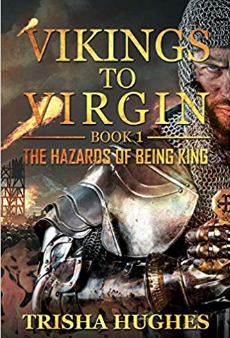
In Vikings to Virgin - The Hazards of Being King Trisha Hughes provides the reader with a pacey introduction to the many pitfalls faced by the ambitious as they climbed the dangerous ladders of royalty. It is easy to think that monarchs are all powerful, but throughout the Dark and Middle Ages it was surprisingly easy to unseat one and assume the crown yourself. But if it was easy to gain ... it was just as easy to lose.From the dawn of the Vikings through to Elizabeth I, Trisha Hughes follows the violent struggles for power and the many brutal methods employed to wrest it and keep hold of it. Murder, deceit, treachery, lust and betrayal were just a few of the methods used to try and win the crown. Vikings to Virgin - The Hazards of Being King spans fifteen hundred years and is a highly accessible and enjoyable ride through the dark side of early British monarchy.
Amazon UK • Amazon US
Virgin to Victoria
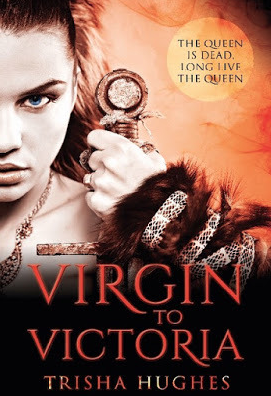 Virgin to Victoria is a powerful retelling of the history of the British monarchy, beginning with Henry VIII's daughter, Elizabeth I, as she comes to the throne. Charting Elizabeth's incredible journey, Virgin to Victoria travels in time through the confusion of the Stuart dynasty, the devastation of a Civil War led by Oliver Cromwell, horrific battles for the throne and the turbulent Hanover dynasty with its intricate family squabbles. Despite her amazing legacy, Elizabeth failed England in one vital area. She never married, nor did she leave an heir to the Tudor family. In making this one fateful decision, the Virgin Queen left the path open for a take-over and life would never be the same. Victoria did not ask to be Queen. It was thrust upon her by a series of events that removed all others who stood in line for the throne. She assumed it reluctantly and, at first, incompetently. Parliament was sure that the 18-year-old could be relied upon to leave the job of running the country to the professionals. Couldn't she?
Virgin to Victoria is a powerful retelling of the history of the British monarchy, beginning with Henry VIII's daughter, Elizabeth I, as she comes to the throne. Charting Elizabeth's incredible journey, Virgin to Victoria travels in time through the confusion of the Stuart dynasty, the devastation of a Civil War led by Oliver Cromwell, horrific battles for the throne and the turbulent Hanover dynasty with its intricate family squabbles. Despite her amazing legacy, Elizabeth failed England in one vital area. She never married, nor did she leave an heir to the Tudor family. In making this one fateful decision, the Virgin Queen left the path open for a take-over and life would never be the same. Victoria did not ask to be Queen. It was thrust upon her by a series of events that removed all others who stood in line for the throne. She assumed it reluctantly and, at first, incompetently. Parliament was sure that the 18-year-old could be relied upon to leave the job of running the country to the professionals. Couldn't she?
Published on January 09, 2019 23:00
The Coffee Pot Book Club
The Coffee Pot Book Club (formally Myths, Legends, Books, and Coffee Pots) was founded in 2015. Our goal was to create a platform that would help Historical Fiction, Historical Romance and Historical
The Coffee Pot Book Club (formally Myths, Legends, Books, and Coffee Pots) was founded in 2015. Our goal was to create a platform that would help Historical Fiction, Historical Romance and Historical Fantasy authors promote their books and find that sometimes elusive audience. The Coffee Pot Book Club soon became the place for readers to meet new authors (both traditionally published and independently) and discover their fabulous books.
...more
...more
- Mary Anne Yarde's profile
- 159 followers



